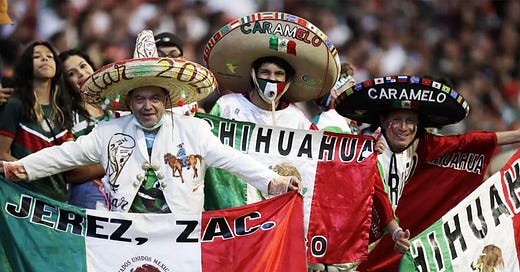Following Father’s Day and Juneteenth, we at History, Rinse, & Repeat have declared today’s article to be a holiday piece. As is our holiday custom, we are publishing a short update to one of our previous articles.
In our article posted on June 9, 2023, this site discussed the decline of Sports Illustrated and the politicization of the Swimsuit issue and of the magazine itself. What was once the premier sports magazine has embroiled itself in political issues, more interested in forays into hot-button topics than reporting on the sporting events that purportedly comprise its editorial mission. A timely example of this phenomenon arose just the past week.
Last Friday, two events took place that were of major significance to American soccer fans. First, it was disclosed that the former coach of the U.S. Men’s National Soccer team, Greg Berhalter, who had been dismissed for a decades-old incident of domestic violence, was to be rehired after a months-long search. On the same night, the national team played a match against Mexico, known as “El Tri” thanks to its tricolor flag, in the tournament known as the Nation’s League. While not the most important tournament, it is still considered by FIFA, the body that governs soccer, to be a competitive tournament (not a “friendly,” soccer’s term for exhibition). The game brought out the top lineups for each respective country. In short, it was a true test of where these archrivals, the dominant teams in the region, stood relative to each other.
The U.S. completely outplayed the Mexicans, winning 3-0, a scoreline that flattered the latter. Mexico did not even get a shot on goal until well into the second half. It was deemed the most thorough thrashing of Mexico in decades, a coming out party for an American team that, in its current iteration, has been long on potential and short on results. The game was so one-sided that by the end, as defeat seemed inevitable, the Mexican players began to take out their frustration on the Americans in classic fashion – with hard fouls intended to injure. As a result, four players were shown red cards, i.e., ejected – two Mexicans for fouls, and two Americans for retaliating. Each team ended the game with 9 players.
As the final minutes ticked down, the Mexican fans demonstrated their frustration as well by employing an anti-gay chant that has become their trademark. It is customary for fans to heckle the opposing goalie during his preparation and run-up to goal kicks. The heckling crescendos with the kick itself, capped off with an expletive at the moment of the kick. While most American fans use a relatively modest expletive, Mexican fans, over a period of years, have employed a term for male prostitute. The cheer usually occurs in Mexican stadiums, although it was heard at last fall’s World Cup in Qatar. Because Mexican fans in Las Vegas outnumbered American, it broke out on Friday. The Mexican soccer federation has been punished in the past for this cheer, and the problem has been ongoing for such a period of time that soccer’s governing authorities have put in place a procedure to pause, or even terminate the games in the event it is employed. One suspects it has become a point of defiance by Mexican fans; it usually breaks out late in games when a Mexican defeat is imminent. To American fans, it is offensive not just for its content, but because they recognize it for what it is – a worn-out way to disrupt a game when Mexico is losing. Per the procedure in place, Friday’s game was paused at the end of regulation, and then stopped with three minutes of stoppage time left, a result likely intended by the unruly fans.
Notwithstanding the distractions at the end, the post-game analysis on the broadcast that night was all about the dominant American performance. If there was a discussion about anything else, it was about the fact that two of the team’s best players would, as a result of red cards, be suspended for the final game of the tournament.
How were the events covered by the press the following day? ESPN’s soccer page led with two stories, both of which rightly focused on the play of the American team. The first, a news account of the game, was headlined: “U.S. trounces Mexico with Pulisic double in feisty CNL semifinal.” It followed with an analysis, headlined: “Chaos overshadows dominant U.S. win vs. Mexico as Pulisic shines.” The website addressed the chants with a video clip, as a Mexican-American commentator termed them “embarrassing.”
In contrast, perusing Sports Illustrated’s soccer homepage the following day, even late in the afternoon, one would have been hard-pressed to know that the national team’s most important game of the season to date, a resounding victory over its most hated rival, had even occurred. Sports Illustrated led with two stories about the women’s national team which, although in a World Cup year, will not play a competitive match for more than a month. It followed with a five day-old story about transfers, and a week-old story about the Champions League final.
The magazine did not even bother to assign any of its own writers to the game. One had to go halfway down the page to discern, among a pack of “headlines,” the following title by the Associated Press: “Play Halted in U.S. Soccer’s Win vs. Mexico After Anti-LBGTQ Chants.” The article itself mirrored the headline. The lead paragraph did not even mention the score, but was about the chants. Any discussion of what actually occurred in the game did not begin until the 13th paragraph, and ended with two further paragraphs.
No analysis of why the U.S. was so dominant. No discussion of the new line-up employed by the interim coach. No discussion of the return of Gio Reyna, who had been controversially frozen out of the team by former coach Berhalter, and whose parents had, in response, precipitated Berhalter’s dismissal (although the article did report that Reyna had dyed his hair blond). No discussion of the play of French Ligue I star Florian Balogun, making his debut for the U.S. (apart from his being roughed up). No discussion concerning the players’ reaction to the game but plenty about their reaction to the chant and the rough play.
Furthermore, for all its reportage about the chant, SI, unlike ESPN, nowhere disclosed that it was the Mexican fans, not American, who were the guilty parties. Instead, it only obliquely mentioned that Mexico had been punished in the past.
There was a time when Sports Illustrated was the first source to read for an in-depth analysis of an important sporting event. That time has long passed. As noted, the magazine did not even assign a writer to the game. Sports Illustrated has lost sight of the fact that, as laudable as their wish to promote women’s teams and LGBTQ rights may be, its primary mission is still to write about sports, a field dominated not just by men, but by men who, in large part, follow sports to escape politics, not to become embroiled in them. The more it ignores that mission, the more likely it will become irrelevant.







Interesting piece, and, not being a soccer fan, it was news to me. Shame about the decline of SI, once a great magazine with serious writing. I suppose that in its current, diminished state, they reason that their focus on everything but sport is the only to get clicks.